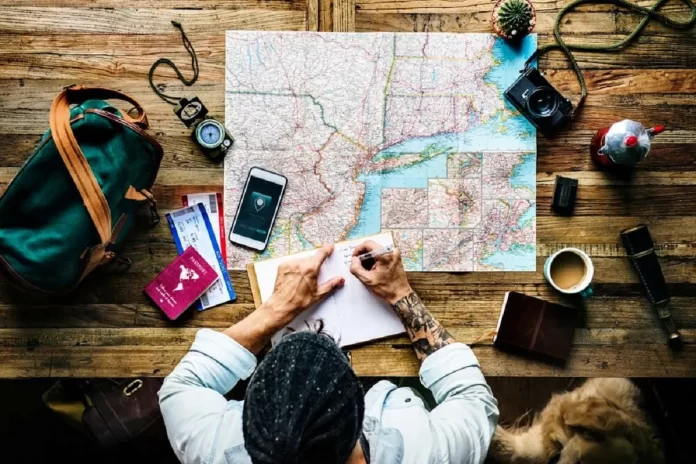When planning a road trip, the initial step is determining the desired destination. Choose a place close to ensuring you can drive to and from the location in one day.
Also, consider the time of year when you are planning your trip. Some destinations are more crowded during certain seasons, and some mountain roads may be closed in the winter.
Navigate
Map It Out
Popular culture might make it seem like road trips involve spontaneously jumping in the car with friends and a clapped-out VW, but successful journeys require planning. Map out your destination, start and end points, and the places you want to visit.
Use an online mapping tool to help you plan your route. While planning the trip, take time to research your destinations. You don’t want to miss a worthwhile museum, memorial, or monument just because you didn’t know about it beforehand.
Map Out Your Route
A road trip offers the flexibility of traveling at your own pace. You can stop as long or short as a time at a destination and detour when you see something cool along the way. You also won’t have to worry about a flight schedule or getting up early to get to the airport for your next leg of travel.
A route map is essential to consider before your trip to discover Iceland. Make a note of places where you’ll have lodging (or backup lodging if you plan camping) and gas station locations. Knowing where you’ll be able to purchase fuel will help prevent the anxiety of running out of gas in an unfamiliar place.
Plan Your Stops
Keeping some room for spontaneity when on a road trip is essential. You’ll likely want to include some of the sights you had initially envisioned, but you also need wiggle room for unexpected adventures.
This flexibility is one of the significant advantages of road trips over other types of travel. You don’t have to worry about flight times or bus schedules and can be more open to exploring local farms, towns, and state parks.
Use an online mapping tool to determine how far you can drive in a day and spread the trip distance out accordingly. Adding extra time on top of the driving distance is a good idea to account for the occasional breakdown or slowdown. Plan where you will stay each night.
Plan Your Meals
A road trip can be economical, mainly if you stay with friends or family who offer their house, condo, or apartment for vacation. But there are other costs to consider, like the wear and tear on your vehicle.
It’s also essential to plan your meals ahead of time, if possible. This will ensure you have enough food and water for your trip. Don’t forget a cooler for drinks and snacks, and ensure you have a few healthy options so you don’t get hungry on the road. Also, keep a few snacks in your trunk that can be eaten while you’re driving. This will help you stay awake and focused on the road. Also, bring a map and have a way to charge your electronics in case you lose cell service.
Plan Your Accommodations
You must plan where to sleep each night during your road trip. Do some research to see what is available for your route and price range. You will also need to plan food. This can be done by checking out the restaurants in the area or by packing meals. You can use a cooler to keep cold beverages and snacks for your road trip.
Another essential thing to do is leave some time margin in your itinerary. This will help you avoid stress and allow for spontaneity. You will also likely encounter traffic and construction on your trip, so it is good to plan for this. This is the best way to ensure your road trip goes well and you can see everything you hope to do.
Plan Your Entertainment
A road trip can be fun to spend with your family or friends. However, the trip can quickly become a drag if you do not plan for enough entertainment.
Make a playlist for your trip with a good mix of songs you all enjoy. You could also try a game where you each take turns guessing different types of landmarks, trees, or other things you see on the drive.
Plan breaks between each driving hour to allow everyone to use the restroom, grab a snack, and stretch their legs. These breaks will help keep your energy up and prevent anyone from becoming too tired to continue driving. This is especially important if you are traveling with children.
Plan Your Route
Road trips are great because they allow for more flexibility than other types of travel. You don’t have to worry about flight times, and if you see something cool while driving, it’s much easier to pull over and check it out than if you were flying 1,000 miles away.
Spend time with your travel companions looking at a map and determining your destination.










